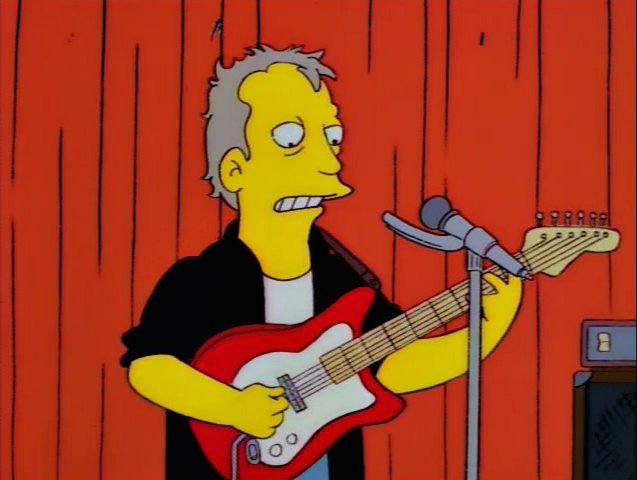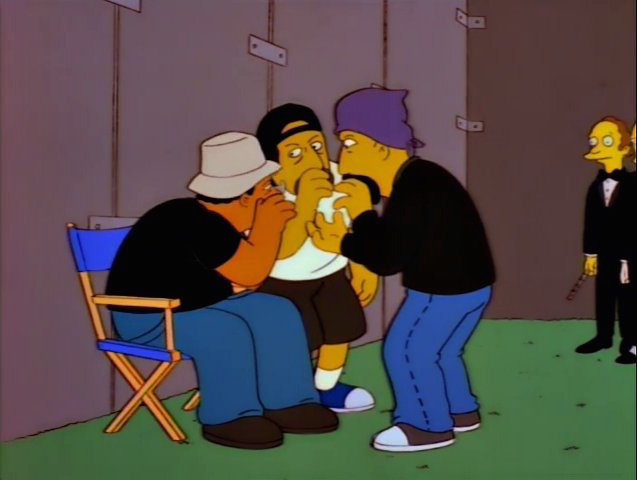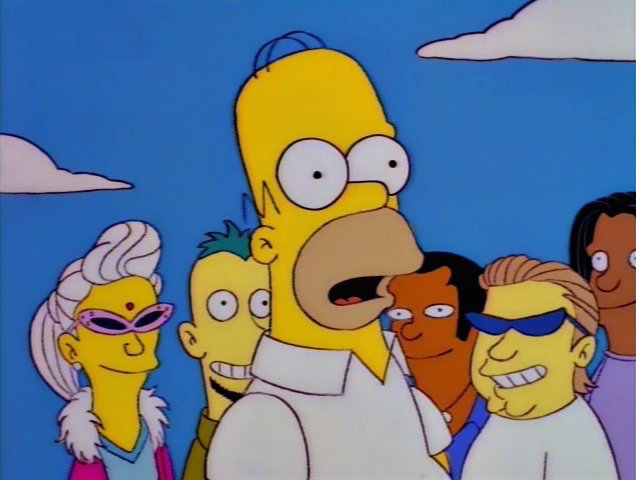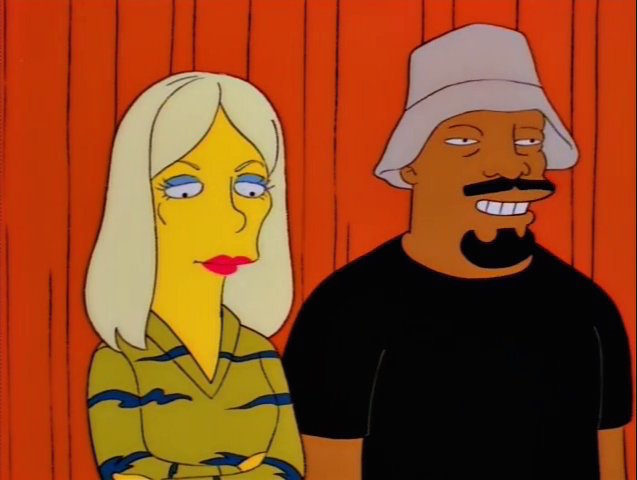In the deep canon of The Simpsons‘ 28-year history, “Homerpalooza” will go down as the show’s “rock and roll episode” and, with a cameo list stacked with bonafide rock stars like The Smashing Pumpkins, Cypress Hill, Sonic Youth, and Peter Frampton all playing themselves, it’s a fitting legacy. But, like most episodes of the show’s classic period in the 1990s, the guest stars and jokes are merely decoration for a deeper story about the human condition. At its heart, “Homerpalooza” is about the burden of aging, and learning to part with youth.
“We wanted this to be a music episode about what’s cool when you get older and how that changes,” says the episode’s co-showrunner Josh Weinstein.
Videos by VICE
The episode, which aired on May 19, 1996, sees Homer, a mid-30s dad, struggling to connect with his kids’ tastes in modern music. In an attempt to bond with them, he pulls them out of school for a road trip to Hullabalooza, a traveling music festival modeled after ones like Lollapalooza, which had been around since 1991. (“It’s like Woodstock, only with advertisements everywhere and tons of security guards,” says Lisa.) After feeling out of place among the crowd of Gen-Xers there, Homer discovers that he has the unique ability to take a cannonball to the gut, and joins the festival’s Pageant of the Transmundane (the freak show) to prove to Bart and Lisa, and himself, that he’s still the cool guy he was in high school.
“Homerpalooza” was the penultimate episode of the show’s seventh season and the last one written by Brent Forrester, who based its premise on his own experience at Lollapalooza. “I was probably 27 at the time, which qualified you as being way too old to be at Lollapalooza,” Forrester remembered in the episode’s DVD commentary, “I was just hassled from beginning to end.” A security guard made him throw out his camera’s batteries upon entering, an experience that became a gag in the episode as Homer was forced to surrender all identification and toss his homemade Kahlua.
“I had a little tape recorder and I was recording notes, and a guy came up to me and goes, ‘How’s it going, narc?’” Forrester added. This also made it into the episode as Homer, trying to strike up friendly conversation with those around him, says, “Cool concert, am I right?” But he’s met with a young, flannel-clad spectator brushing him off, scoffing, “Yeah, nice try, narc.” Everyone within earshot then labels Homer as a narc and crowdsurfs him out. “All of Homer’s alienation was my experience of feeling like a loser there,” said Forrester.

The ensemble cast of “Homerpalooza” was booked the same way actual music festivals are typically booked: the show’s staff compiled a list of artists who would make a well-rounded bill and went after them.
“You have a dream list and then you see what works out,” says Bonita Pietila, the show’s longtime casting director.
“We wanted to have somebody who represents every type of music,” says Weinstein. “So we wanted somebody from indie music, we wanted somebody from hip-hop, we wanted somebody from classic rock. So that’s sort of how we started to cast the net.”
For their classic rock elder statesman, the creators threw around names like Bob Dylan and Bruce Springsteen (both have still never guested on the show), but ultimately landed Peter Frampton, a bit of serendipity that worked in the episode’s favor since the staff is largely in agreement that he had the best acting chops of the lot.
“He’s sort of like the ideal guest star: he’s willing to make fun of himself, he’s got a great sense of humor, and he had a great voice. He was just really fun and we ended up wanting to do more with him,” Weinstein says of Frampton. “We liked him so much, we were like, ‘Shit, we should do a whole show around him.’”

Frampton is wreaked havoc upon in the episode, getting his cooler ransacked by Sonic Youth, his inflatable pig stage decoration ruined by Homer, and his orchestra stolen by Cypress Hill, and he perfectly sells his griping and grumbling throughout, even ad-libbing a bit as he storms off stage.
The episode’s showrunners also wanted the “founders of alternative rock” represented at Hullabalooza, and booked Sonic Youth, a favorite of Weinstein and creator Matt Groening. The band also recorded the episode’s theme song and had a connection to the show through bassist Kim Gordon. “When we were invited to do the show, we asked specifically if we could record the end credits theme,” remembers Sonic Youth guitarist Lee Ranaldo. “It has a doubly significant meaning for us because [original theme song composer] Danny Elfman was an early LA boyfriend of Kim’s! We were told that no one up until that time had been allowed to cover the song, and felt quite honored that they let us do it.”
As for the Smashing Pumpkins, their role was originally intended for the band Hole. Hole frontwoman Courtney Love was meant to introduce herself to Homer with, “I’m a big fan, Homer. Courtney Love.” To which Homer responds, “Homer, grateful.” But Love was hard to pin down and also apparently caused some internal disputes. Groening recalled trying to book an unnamed guest for the show on the episode’s DVD commentary: “I said, ‘We’ve got so-and-so and Courtney Love.’ And they said, ‘If Courtney Love is in, we’re out.’” (Both Cypress Hill and Sonic Youth allegedly had physical altercations with Love at Lollapalooza ’95.) Ranaldo ultimately took credit, telling Entertainment Weekly in 1996 that “if she was going to be involved, we weren’t.” (Though, speaking now, Ranaldo disputes this account.) Love’s line instead went to Pumpkins frontman Billy Corgan and the dialogue was changed to:
“Billy Corgan, Smashing Pumpkins.”
“Homer Simpson, smiling politely.”

The show’s hip-hop act was a much easier booking. Cypress Hill had been selective in lending their image out until then, but jumped at the chance to be on the show. “In the past, I was very skeptical about doing certain things, especially us in cartoon form,” says Cypress Hill member Sen Dog. “But when I got that call, I’d been a fan of The Simpsons and I’d been watching it since it first came out, so I was like, ‘Yes! Heck yeah, let’s do it.’”
Although Sen Dog admits to being a bit nervous about his first voiceover acting gig, he and his bandmates spouted out some of the episode’s most quoted lines. In one famous scene, the band deals with ordering the London Symphony Orchestra for their performance, “possibly while high,” and leads the tuxedoed violinists and clarinet players in a classical version of their song “Insane in the Brain.” For many Simpsons fans, the two groups are forever connected, and both even reminisced about it on Twitter recently.

As seen in previous episodes of The Simpsons that had featured entire musical groups (including Aerosmith, The Ramones, and Spinal Tap), lines of dialogue are dispersed across all the members so that each guest contributes. “We invite the whole band, we don’t invite one person,” says Pietila. “So if the whole band is there, they should all participate as equally as possible.”
While Sen Dog’s bandmate, B-Real, got the honor of mimicking Nelson Muntz’s famous “haw haw,” Sen got a line that follows him to this day. Adding on to Kim Gordon’s quote about music festivals being “about music, and advertisement, and youth-oriented product positioning,” Sen Dog, whose band is so marijuana-positive that they are banned from SNL for life for lighting a joint on air, says, “That, and getting toasted. Niiiicely toasted.”
“Every now and then, people will want an autograph and they’ll say, ‘Hey man, can you write: getting toasted, nicely toasted?’” Sen says. “That line really got to people for some reason.”
One act that didn’t get any lines but sneaked into the episode under the noses of most viewers was No Doubt. The band’s 1995 album Tragic Kingdom was starting to break out, edging onto the Billboard charts by January of 1996. Frontwoman Gwen Stefani’s brother, also an original member of the band, was an animator for The Simpsons at the time and suggested they be included as an inside joke. “He put that in under our approval and we’re like, ‘That’s awesome,’” remembers Weinstein. As a result, the four-piece can be seen in the background of one scene, though never named directly.

Pearl Jam also reportedly turned down the invitation to appear. “I kind of remember Pearl Jam at the time was contacted,” says the episode’s co-showrunner Bill Oakley, “and then at a concert, I believe, they asked an audience, ‘Should we go on The Simpsons?” And I think the verdict was ‘No.’ So they didn’t do it.”
Over 20 years later, all of the artists in “Homerpalooza” have had enduring legacies, some perhaps even aided by their Simpsons immortalization.
“People ask about it all the time, and know all the images of Sonic Youth from the show,” says Ranaldo. “For many people it’s still their ‘gateway drug’ into Sonic Youth. We are more known for being on The Simpsons than any other thing we ever did, I think!”

Sen Dog also credits the show with expanding Cypress Hill’s fanbase. “I honestly felt like it opened us up to a younger demographic when we did The Simpsons,” he says. “There were a whole bunch of younger kids who’d probably never heard of Cypress Hill until they saw us on their favorite TV show. I think that really helped us out a great deal.”
Though “Homerpalooza” has cemented its place as a classic among The Simpsons‘ 620 episodes (and counting), Oakley says the impact the show had was harder to gauge at the time. “The thing about The Simpsons back then is that we were broadcasting this stuff into a void,” he says. “The internet was still in its infancy and critics weren’t particularly interested in reviewing shows that had been on the air for seven years. Occasionally you would get a letter from someone, but people who write letters to TV shows are an odd bunch.”
Music festivals have become a multi-billion dollar industry since “Homerpalooza” aired, with dozens of new ones cropping up across America over the years, including Coachella, Governors Ball, Riot Fest, Boston Calling, and dozens more, which collectively bring out over 32 million people annually. When asked if “Homerpalooza” were written today, neither Oakley nor Weinstein are willing to even venture guesses as to what acts would serve as guests. Oakley, who lent his love for Grand Funk Railroad to Homer for the episode, points to a quote from Marge for his feelings on the matter: “Music is none of my business.”
“That’s been my opinion for about 35 years,” Oakley laughs. And Weinstein says he wouldn’t ever want to mess with the original. He says he still loves Cypress Hill and Sonic Youth: “I’m going to stick with the classic episode now so they don’t get mad at me.”

In the episode’s third act, all of the show’s guests gather to watch Homer as he is faced with a choice: either chase his rock and roll dreams by taking a cannonball to the gut, which his doctor warned would kill him, or duck, thereby admitting that middle-aged dads are too old to rock. Homer chooses to live rather than risk it all, and finds peace in living a quiet family life. Some of the show’s guests, though, who are now all older than Homer, might disagree with him.
“I don’t believe that you ever get too old to rock,” says Sen Dog, who still plays in Cypress Hill at 51 as well as his metal band Powerflo. “I think the one thing that may stop you is that you get bored with it. But I think as long as you have the passion for it, get out there and do it.”
“There is a rock ‘n’ roll lifestyle and then there is a rock ‘n’ roll life,” says the 61-year-old Ranaldo, who still makes music and in fact answers these questions while on the road promoting a new solo album, Electric Trim. “I’m a lifer and in this for the creation and the art, not so much the wild partying, although it can be fun.”
But for those like Homer who have stared down their aging faces in the mirror or felt behind the times while looking at the posters hanging at the record store, “Homerpalooza” represents a rite of passage. It captures the moment in life when you swallow the hard pill that a new generation has come up behind you to reclaim what’s hip, making you as uncool as you remember your parents being.
“It still holds as one of my favorite episodes,” says Weinstein. “Because it means something to me now when I watch it, and I’m 51 years old. And when I produced it I was, what, like, 30 or 29. I was a young man when I watched it and thought I was cool, and now, I’m like Homer and I feel very uncool. And it rings true as you get older. It rings true for different reasons. And the thing that makes The Simpsons great is when it rings true and it speaks to your life. I think in that way, it’s a classic.”
Dan Ozzi and Alex Robert Ross are on Twitter.
Note: This article has been updated to clarify Lee Ranaldo’s position on the dispute with Courtney Love.
Listen to an episode about this article on The Vice Magazine Podcast:
More
From VICE
-

AEW -

Westend61/Getty Images -

Illustration by Reesa -

Screenshot: Midwest Games
